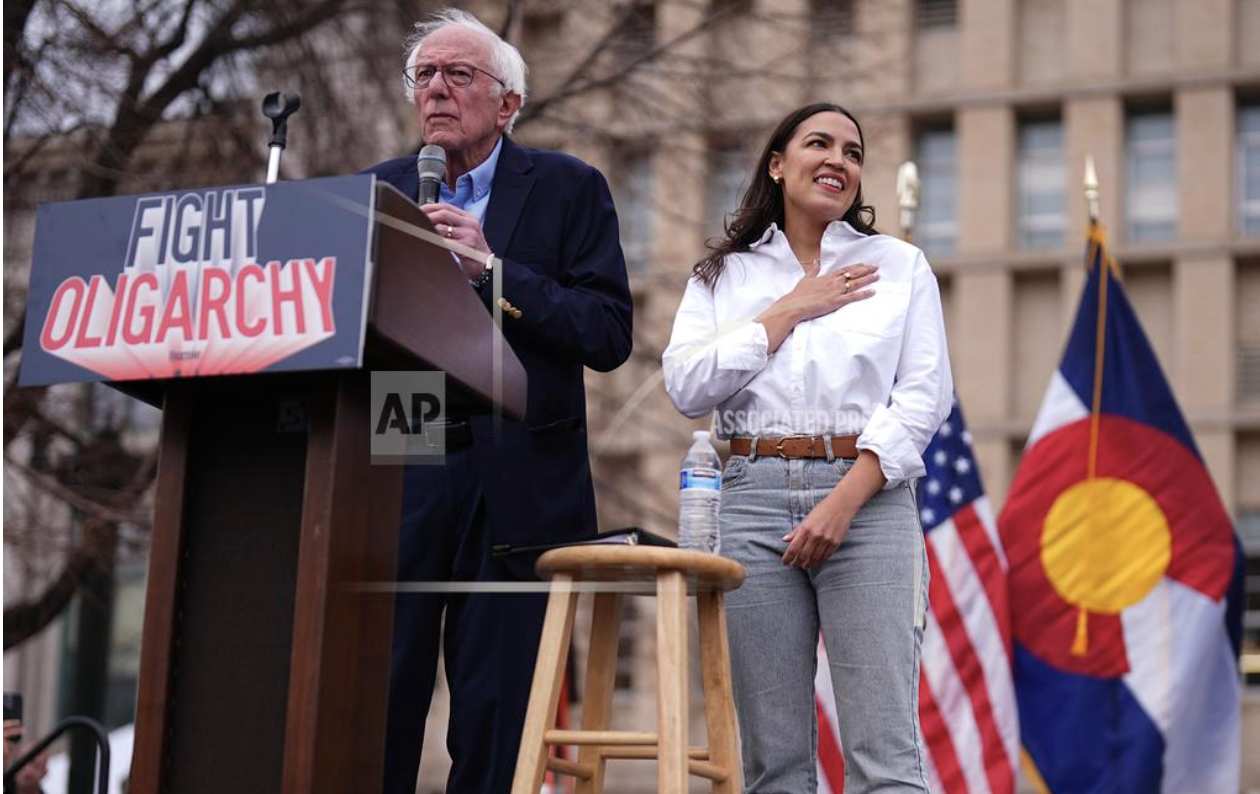Speeches, Tours, and Tariffs: How Politicians Are Protesting Against the Drastic Change in the U.S.’s Role in the World
Sen. Cory Booker speaking to reporters shortly after finishing his 25 hour speech on April 1, 2025 Photo: Francis Chung/POLITICO/AP Newsroom
In the U.S., there’s been an increase in opposition to the executive branch among Democratic and left-leaning politicians. Democratic Sen. Cory Booker from NJ gave a 25 hour and 5 minute speech to the Senate on April 1, 2025, stating that he aimed to disrupt “the normal business of the United States Senate for as long as I am physically able.” Indeed, his speech became the longest Senate speech on record. Beginning on Monday March 31 at 7 pm and continuing until Tuesday April 1 at 8:05 pm, he covered topics such as education, immigration, health care, and national security, only pausing for questions from Democrat colleagues and without eating or using the bathroom. Booker received over 350 million likes on a tiktok live stream, showing the sheer amount of support he gathered. To prepare for the speech, he began fasting Friday night, and on Sunday, he stopped drinking water. Booker ended his historical speech by quoting civil rights activist John Lewis: “He said for us to go out and cause some good trouble, necessary trouble, to redeem the soul of our nation. I want you to redeem the dream. Let’s be bold in America.”
Sen. Bernie Sanders and Rep. Alexandria Ocasio-Cortez at a “Fighting Oligarchy” tour stop in Denver, CO (Photo: David Zalubowski/AP Newsroom)
Additionally, VT Sen. Bernie Sanders, an independent, has launched a “Fighting Oligarchy” tour after Trump was elected to the presidency. Through which, Sanders wants to “rally people to get engaged in the political process and run as independents outside of the Democratic Party.” He has a complicated history with the Democratic Party, which has recently lost control of Congress and the Presidency, believing that if the Democratic party wants to gain support, they must “let working-class leadership come into the party.” Sanders has described the current administration as “a government of the billionaires, by the billionaires and for the billionaires.” In March 2025, Sanders, with NY Democratic Rep. Alexandria Ocasio-Cortez, held various rallies in locations such as Las Vegas and Tempe, AZ. At one of his rallies, Sanders spoke directly to the Trump administration at his rally, saying, “We will not allow you to move this country into an oligarchy.”
On the international stage, there’s been much opposition to the U.S.’s changing role, with much chaos caused by new U.S. tariffs. China, South Korea, and Japan, three nations with a history of rocky relations, have been discussing appropriate responses to Trump tariffs. All three countries have agreed to have more conversations about export controls and to strengthen supply chain cooperation. During a Sunday, March 30, 2025, meeting in Seoul, South Korea, the nations’ trade ministers decided to fast-track talks for a South Korea-Japan-China free trade agreement meant to promote “regional and global trade.” Additionally, Canada’s new Prime Minister, Mark Carney, said on March 27, 2025, that the U.S. was “no longer a reliable partner” for trade after introducing a 25 percent tariff on cars and parts imported into the U.S. Carney stated that Canada would retaliate, that “nothing is off the table as we defend our workers and our country.” Yet, on April 2, 2025, Trump enacted his most expansive tariffs yet. These 10 percent tariffs will be placed on all U.S. trading partners, over 100, except for Mexico and Canada. The U.S. will implement 34 percent tariffs on Chinese goods, 20 percent tariffs on European Union imports, 24 percent tariffs on Japanese goods, and 26 percent tariffs on India’s exports to the U.S.
There’s much contention among domestic and international politics at a pivotal moment after drastic changes to U.S. policy. Domestically, there’s a concern about the growing divide in the nation and the changing role of the federal government. Internationally, there’s much concern about the U.S. veering from its traditional foreign policy course, abandoning its allies, and changing global trade. Due to new developments in policy in Washington, those in the U.S. and internationally have decided to take action, such as Booker delivering the longest speech in Senate history, Sanders going on a “Fighting Oligarchy” tour, and world leaders condemning new U.S. tariffs.


